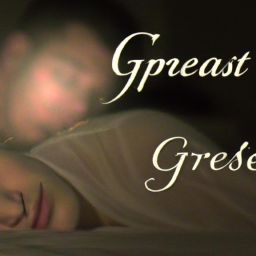Experiencing the loss of a loved one firsthand has allowed me to understand the difficulties of coping with the overwhelming emotions that come with grief. One of the most challenging aspects of dealing with bereavement is coming to terms with the fact that our loved one is no longer with us in a physical form.
However, many people find comfort in the belief that their loved one is still with them in some way, perhaps even visiting in their dreams. In this article, we will explore the topic of dreams about someone who has passed, including the science behind why we dream, common themes in these types of dreams, and strategies for coping with the emotions they can bring up.
Dreams about the deceased can be a source of both comfort and confusion, as they often feature vivid, intense imagery that can feel very real. Some people believe that these dreams are direct messages from the deceased, while others see them as simply a projection of their own subconscious thoughts and feelings.
Regardless of how you interpret them, it’s clear that dreams about someone who has passed can have a significant impact on our emotional well-being. By understanding the science behind dreaming and learning to interpret the messages these dreams may contain, we can find peace and healing in the midst of our grief.
Key Takeaways
- Dreams about someone who has passed can be a source of comfort and confusion during the grieving process.
- They can be seen as either direct messages or subconscious projections and can impact emotional well-being.
- Common themes in these dreams include reassurance, communication, unresolved issues, closure, and regret.
- Coping strategies include seeking support from loved ones or professionals, visualizing happy memories, and finding healthy ways to cope with these dreams.
Understanding the Grieving Process
You’re going through a tough time, but it’s important to understand that the grieving process is unique to each individual. There’s no right or wrong way to grieve, and it’s okay to take your time and feel all the emotions that come with losing someone you love.
It’s important to remember that grief doesn’t have a timeline, and it’s not something that you can simply ‘get over’ in a certain amount of time. During the grieving process, you may experience a range of emotions, from sadness and anger to guilt and confusion.
It’s important to allow yourself to feel these emotions and to seek support from loved ones or a professional if needed. Understanding the grieving process can help you navigate through it and find healthy ways to cope.
Now, let’s move on to the science behind dreams and how it relates to the grieving process.
The Science Behind Dreams
When your mind is in a state of sleep, it can conjure up vivid and emotional experiences that feel just as real as if they were happening in waking life, bringing forth a flood of memories that flood your senses like a river.
Dreams about someone who has passed can be particularly intense and emotional, as they bring up memories and feelings about that person that may still be unresolved. But what causes these dreams?
The science behind dreams is still not fully understood, but there are some theories that suggest that dreams are a way for our brains to process and consolidate memories, emotions, and experiences.
During sleep, our brains go through different stages of activity, including Rapid Eye Movement (REM) sleep, which is when we tend to have the most vivid dreams. Some researchers believe that during this stage, our brains are processing and consolidating memories and emotions, which can lead to dreams about loved ones who have passed.
These dreams can be comforting or distressing, depending on the individual and their relationship with the deceased. In the next section, we will explore some common themes in dreams about the deceased.
Common Themes in Dreams about the Deceased
Experiencing vivid and emotional encounters with loved ones who are no longer with us is a common occurrence during sleep, often stirring up unresolved feelings and memories. Dreams about the deceased can be both comforting and unsettling, but they may offer insight into our own emotions and the impact the person had on our lives. As I’ve researched common themes in these types of dreams, I’ve noticed patterns that many people seem to experience.
One way to categorize these themes is through a table that highlights the different types of interactions people have with those who have passed. Here is an example of a table that displays common themes in dreams about the deceased:
| Theme | Description |
|---|---|
| Reassurance | The deceased offers comfort or reassurance to the dreamer |
| Communication | The dreamer communicates with the deceased, either through conversation or nonverbal cues |
| Unresolved Issues | The dreamer confronts unresolved issues they had with the deceased |
| Closure | The dreamer experiences a sense of closure or resolution regarding the deceased |
| Regret | The dreamer feels regret or guilt over their relationship with the deceased |
While everyone’s dreams and experiences are unique, these themes can provide a starting point for interpreting dreams about the deceased. As we delve deeper into this topic, we will explore ways to understand the meaning and significance behind these dreams.
Interpreting Dreams about the Deceased
As I navigate the mysterious landscape of my slumber, the symbols and imagery that manifest in my subconscious mind can provide meaningful insight into the complex emotions surrounding my relationship with those who’ve transitioned to another realm.
When I dream about someone who’s passed, I often feel a mix of emotions, including sadness, longing, and confusion. However, these dreams can also be a source of comfort and healing, as they allow me to connect with my loved ones in a way that feels real and tangible.
Interpreting dreams about the deceased can be a complex process, as the symbols and imagery that appear in these dreams are often highly personal and subjective. However, some common themes can provide insight into the emotional landscape of these dreams.
For example, dreams about deceased loved ones often involve themes of closure, forgiveness, and healing. By paying close attention to these themes and exploring the emotions that arise in response to them, I can gain a deeper understanding of my own feelings about the person who’s passed.
With this understanding, I can begin to develop coping strategies for dealing with dreams about the deceased.
Coping Strategies for Dealing with Dreams about the Deceased
To cope with these emotional experiences, I find it helpful to try visualizing a happy memory with my loved one who’s passed. This can bring a sense of comfort and peace, as I’m reminded of the positive moments we shared together. It can also help me feel connected to them in a meaningful way, even though they’re no longer physically present.
Another coping strategy that’s worked for me is talking to a trusted friend about my feelings. Sometimes just having someone to listen and validate my emotions can be incredibly helpful. It can also be beneficial to seek support from a therapist or grief counselor who specializes in helping individuals process their emotions surrounding the loss of a loved one.
Overall, finding healthy ways to cope with dreams about the deceased can be an important part of the grieving process.
Frequently Asked Questions
Can dreams about someone who has passed be a sign of communication from the afterlife?
As they say, "where there’s smoke, there’s fire."Whether or not dreams about the deceased are communication from the afterlife, they can provide comfort and closure for those left behind.
Do dreams about the deceased always have a deeper meaning or can they just be a result of processing grief?
Dreams about the deceased don’t always have a deeper meaning. Sometimes, they’re just a result of processing grief. It’s important to acknowledge and work through our emotions surrounding loss.
Why do some people have recurring dreams about the deceased while others don’t dream about them at all?
It’s interesting that only 37% of people report having dreams about deceased loved ones. I wonder why some of us have recurring dreams while others never do? Maybe it’s a personal coping mechanism or a sign of unresolved emotions.
Is it possible to control or manipulate dreams about the deceased?
I can try to influence my dreams by focusing on the person I want to dream about before going to bed. However, there is no guarantee that I will actually dream about them.
Can medication or therapy help prevent or reduce the frequency of dreams about the deceased?
I’ve found that medication and therapy have helped me manage the frequency of my dreams about a loved one who passed away. It’s not a perfect solution, but it has given me some relief. As they say, every little bit helps.
Conclusion
In conclusion, dreams about someone who has passed can be both comforting and unsettling. They’re a natural part of the grieving process and can provide a sense of connection to the loved one who has passed.
While the science behind dreams isn’t fully understood, common themes in dreams about the deceased can offer insight into our own emotions and unresolved feelings. It’s important to remember that dreams aren’t necessarily messages from the afterlife, but rather a reflection of our own subconscious thoughts and feelings.
Coping with these dreams can be challenging, but finding healthy ways to process our emotions and seek support can make a difference. As someone who’s experienced these dreams firsthand, I know that they can be a powerful tool for healing and coming to terms with loss.
Like a beacon of light in the darkness, they offer a glimmer of hope and a chance to reconnect with those we’ve lost.









